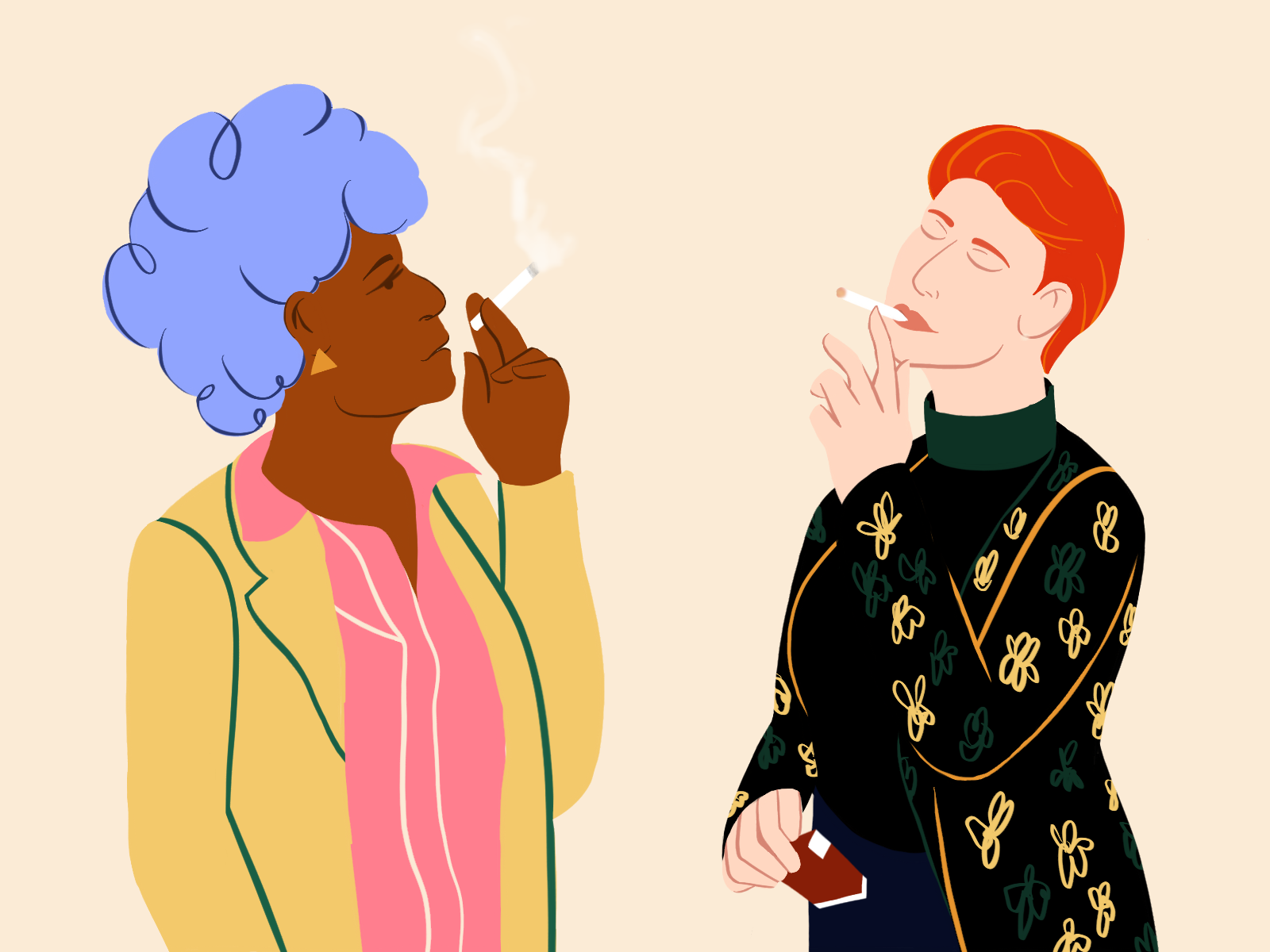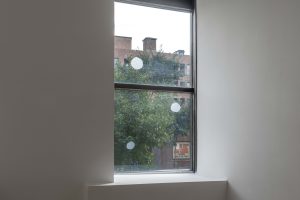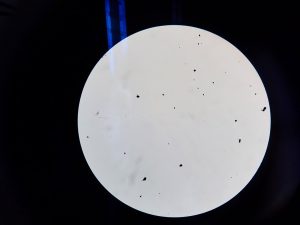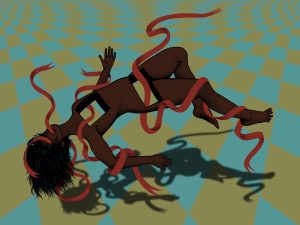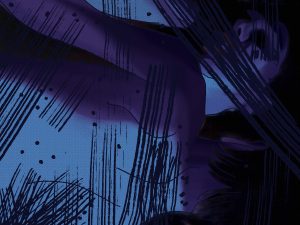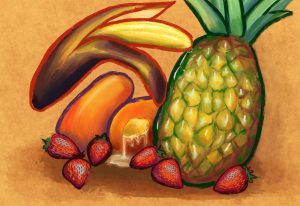Featured Image: Illustration of two people standing together and smoking cigarettes. Illustration by Kiki Lechuga-Dupont.
Content Warning: suicide ideation
“I write from morning till night, believing in the power of my words to recreate what I have lost. I enter a parallel world hoping it will prove less treacherous, but the questions that haunt me remain unsolved.”
All Men Want to Know
Nina Bouraoui
Where do you see yourself in five years?
I wasn’t expecting that question. I stare at my new physician, an older Greek man with a rectangular jaw and what I suspect may be a fading perm, though it’s hard to tell through his thick application of hair gel. When I scheduled the appointment, I searched his name and discovered his staff profile on the Howard Brown website, which listed some of his interests—HIV, acupuncture, beekeeping. He sat with his legs crossed and his pen held aloft, prepared to start writing whenever I started talking. I was tempted to ask him about beekeeping, but it didn’t seem appropriate. I opened my mouth and then closed it.
Well, okay. Let’s try another angle. He talked quickly, rapidly firing off questions. Do you see yourself working? Not working? With a partner? Without a partner? Boobs? No boobs? What kind of genitals do your partners usually have, vaginas or penises? What do you picture yourself wearing? I suppose we should talk about sperm banking if I’m going to send you home with an estrogen prescription today. Do you want children? I can bring the brochure when I come back, or I’ll have the nurse bring it. Did I give you the informed consent form yet? He cocked his head and stared at me. I shake my head.
No, I’m not interested, I said after thinking about it for a moment. I was too preoccupied trying to figure out if I had heard him correctly to consider a decreasing sperm count or potential infertility. Did he say that he was sending me home with an estrogen prescription today? From what I understood from the HRT FAQ on Howard Brown’s website, this first appointment was supposed to be an informational consultation. I cross my legs and place my hands primly on my knees, trying to appear more feminine by making myself smaller.
Well, where do you see yourself? He asked again, scribbling something on my chart. He didn’t wait for my answer. Instead, he explained that he was going to mark it on my chart as an endocrine disorder for insurance purposes. It’s the easiest way to get it covered. Now, if you’re thinking about surgeries, that’s a different story… He has me sign a consent form, reading me some of the effects: you’ll grow breasts; your testicles will shrink; you’ll produce less sperm; you’ll lose some muscle tone; your skin will get softer; you’ll have a reduced sex drive. And then he lists some of the risks of HRT: loss of fertility, blood clots, cancer—this hasn’t been proven, so I wouldn’t worry—higher blood pressure, but that’s easily remedied by taking an aspirin every so often. Do you have any questions?
I shook my head no, the same way I always do whenever someone asks if I have any questions. Some primal part of me loathes asking questions, being forced to admit that I don’t know everything, that someone else has some knowledge that might be useful to me. If I don’t know, I’ll figure it out. Suffering has a certain nobility. Anyways, I was too preoccupied thinking about my skin getting softer. I ran one of my hands up and down my thigh, which I had shaved the night prior, worried that the physician would decide I wasn’t feminine enough to prescribe me estrogen. I held my legs together and was amused at how much they looked like boiled hot dogs.
Have you thought about it? Where you see yourself.
I guess I see myself working, I replied. He asks me what I do for work, and I respond with my usual, I work for a nonprofit as a professional fundraiser. I feel embarrassed to admit that only one image comes to mind when I try to imagine my future: I see myself writing.
A few months later, while dog sitting for a friend who was on vacation in New York City, I invited Guy over. I suggested that we could take my friend’s dog Winston for a walk. Ignoring the severe weather alerts on my phone, I took the train back to my apartment so that I could change into a more flattering pair of jeans and spritz myself with my jasmine perfume. The rain was torrential. I waded through ankle-deep water on Lawrence Avenue, holding my tote bag above my head in an ineffectual attempt to shield myself from the sideways sheets of rain. My hair still hadn’t dried by the time I decided to make the trek back to my friend’s apartment, so I ended up wearing a pink baseball cap. When Guy arrived, we opted to have tea in my friend’s living room, joking that there’s always extreme weather when we try to hang out. Too much water energy between the two of us, I say, and then cast my gaze down, staring at my lap. I hope he doesn’t think I’m suggesting I think there is an us.
Guy moves, sitting on the opposite end of the couch, the most sexless distance possible in the cramped space. It’s kind of embarrassing and weird to admit, but I’ve wanted a baby so badly lately. I really want to be around someone who’s pregnant because I can’t have a baby, obviously. He gestures to his stomach.
Obviously, I echo and roll my eyes. My chest feels constricted as though I’m wearing a too-tight t-shirt. I roll my bottom lip in between my index finger and thumb, tugging occasionally. I can’t help but wonder, is that why he broke up with me, because I would never be able to give him a child? Because we could never create a child together, they would have to be either mine or his. We would have to conscript another woman to carry the child. Or, we would have to adopt or foster, taking a stranger’s child as our own. Either way, the process would be difficult. More difficult than if he simply dated a cis woman. Why would he say this to me now? Did he want to point out my body’s biological incapability of mothering a child for him? No amount of gender-affirming surgery or HRT can change that fact. Maybe it’s his way of explaining his inexplicable behavior after the fact. A thought floats across my mind, It’s probably too soon for us to hang out as friends. I tamp it down quickly.
I think about a passage from Laurie Colwin’s Goodbye Without Leaving. Geraldine is preparing to have a child, and she asks her friend Mary to be a godmother and suggests that Mary will marry her pseudo-boyfriend William and move away. Mary is adamant. She won’t marry William. Geraldine asks:
“‘Then what are you doing with him?’
‘I’m having a friendship,’ Mary said, settling in on the couch. ‘It’s a kind of friendship of struggle, and when I get through the struggle I’ll know something important.’
‘Like what?’
‘If I knew I wouldn’t have to struggle.’”
I keep having fantasies about being pregnant since starting HRT; I stand in front of my mirror, pushing out my stomach so that it swells, arching my back to exaggerate the effect, placing a palm above and below the pseudo-baby bump, stroking my stomach softly. I imagine feeling nauseous, kneeling beside the toilet and urging myself to puke, except nothing comes up even when I stick my index and middle finger to the back of my throat. I pretend my ankles and fingers are swollen because my body is retaining water to nourish my budding child and not because my veins are swelling to relieve heat. I imagine that my weight gain is nourishing a new life rather than just being a symptom of my overeating, ordering too much fast-food delivery because I can’t find the energy to cook. I fantasize about perching my child in my lap, stroking their silky hair, reading to them, and imparting on them my understanding of the world.
I become suspicious of these fantasies. Do I only want a child so I can treat them as a copy of myself? As though I placed myself on the glass tray of a printer and watched as the printer heads whirred back and forth, replicating my hues and shades as close as possible? What does it matter? I know that any child I have would eventually rebuke my worldview, adopting their own, filling their own life with their own despair, their own love, their own struggles, their own thoughts separate from mine.
It occurred to me the other day that I read an excessive number of books about mothers.
I read books about mothers who love their children, who resent their children, who abandon their children, who feel betrayed by their children, who feel adored by their children, who sacrifice everything for their children. I read books by authors who write about their mothers, who struggle to understand their mothers, worship their mothers, disparage their mothers, fondly remember their mothers, forget their mothers, abandon their mothers, find themselves reflected in their mothers. I read books by authors who are mothers themselves, who try to describe the constant struggle between being a writer and being a mother, naming everything they’ve sacrificed in along the journey of doing either. I read books about mothers because I want to understand motherhood. I read books about mothers because I’m trying to answer this question for myself: Do I want to be a mother?
Recently, I was reading Nina Bouraoui’s All Men Want to Know, annotating a passage where Bouraoui describes spying on her mother as she reads on their apartment’s balcony in Algiers:
“She clutches her novels to her breast, she mustn’t be disturbed. She closes her eyes, and I have the feeling she and her books go to sleep together, skin to skin, as if the books were alive.”
My own mother often reads in bed, dozing off with the book still clutched in her grip. I was an annoying child, always creeping downstairs late at night to ask if I could sleep in my parent’s bed, complaining about nightmares or feeling ill. I jabbed my mother on the shoulder with one of my tiny fingers, again and again, to wake her up. She usually jerked awake, making some guttural, throaty sound in between a snore and a gasp; a startled noise, as if she couldn’t believe she had fallen asleep. She’d scramble to find the bookmark she had set on her nightstand (many of her bookmarks were from the Christian bookstore and inscribed with popular bible verses) claiming that she hadn’t been sleeping but had just closed her eyes for a few minutes.
For a while, she and my dad let me sleep in their king-size bed, nestled between them, but eventually, they must have decided I was too old, or too big, or perhaps they just wanted some respite from being with me, so my mom told me that I had to sleep on the floor instead. Undeterred, I presumptuously brought my blankets—a Toy Story comforter with Buzz Lightyear on one side and Woody on the other and a white blanket with colorful dinosaurs—as well one of my stuffed animals, if not several of them. I preferred a khaki-colored alligator. I liked it because it had glass eyes that I rubbed with my fingers like a good luck charm and was long and firm enough that I could cling to it like a body pillow. I made a small nest on my mother’s side of the bed, always my mother’s side, and went to sleep, staying there for several nights until she got tired of waking up in the early morning to go to the bathroom and accidentally stepping on me as she got out of bed. She would banish me from her room, saying, You need to sleep in your own bed for once. Reluctantly, I would go back to the room I shared with my older brother Duncan, hanging my head dejectedly as I gathered up my blankets and stuffed animals, dragging them behind me like the train of a gown.
I remember laying on the floor of my mother’s library as a child, surveying her bookshelves, which lined two walls from floor to ceiling. I was trying to decide what to read. I gravitated towards the shelf with classic works of literature, most of them purchased for my brothers’ high school English classes and abandoned afterwards, usually unread. I took copies of Emily Brontë’s Wuthering Heights, Mary Shelley’s Frankenstein, and Isak Dinesen’s Out of Africa. I still have my mother’s copy of Out of Africa somewhere in my personal library, even though she berated me once and asked for it back, saying that it was a gift from a friend. One of the shelves in her library was full of books on writing with titles like, How to Write Plots that Sell, The Writer’s Guide to Beginnings, Creating Unforgettable Characters, The Emotion Thesaurus: A Writer’s Guide to Character Expression, and The Complete Book of Baby Names. I borrowed them and read them while in the bath, resting them on the porcelain edge so I could make notes in my small composition notebook, mostly using the insight to write fanfiction that I posted to a Zoo Tycoon forum page I frequented. I would slowly accumulate them in a small stack in my room until my mom noticed the glaring hole on her bookshelf and reprimanded me, Stop taking my things. Put them back when you’re done.
It’s not like you use them anyways. I said.
As an adult, I read before bed like my mother, except I don’t fall asleep with the same grace she managed. I drop my books beside me whenever I fall asleep, losing track of my page and pushing them aside later in the night like a lover whose body heat has become unbearable. There’s always a pile of half-read books nestled between my sheets.
My mother asks me, You used to be such a happy and loving child, what happened?
I stare dumbly. I don’t have an answer. I think for a while, trying to pinpoint the exact moment my childhood ended or map the chain of events that I could point to and say, Does it make sense now? Can you see that I lost a little bit of my innocence here, and then a little more here, and then a great deal here and there was no stopping it then. It’s like a house that’s infested with mold, it’s only a matter of time before the spores creep through all the walls. If I spend enough time thinking about it, I usually arrive at the same origin point—when I wrote my first suicide letter, the only one that I would share with my mother. To be precise, I didn’t explicitly share it with her. I left it on her desk, tucked halfway underneath a stack of unpaid and overdue bills. Later, I tried to throw it away before she found it but failed.
The situation is tragicomic to me looking back. I wrote the note using multiple colored sharpies on a folded piece of printer paper. I titled it and everything: Mission God. I named where and how I would do it, as if I was playing a game of Clue with my siblings and had slyly solved the mystery, laying each card on the table in a dramatic fashion and reading off their contents. The kitchen. With a knife. Myself. I didn’t describe where I would make the cut. I was too young to know which veins, once opened, could empty a body the quickest. I couldn’t have been older than 11 or 12. Old enough to decide that I preferred the unknown of death to the unknown life that stretched before me, all the suffering that awaited me.
My mother cried uncontrollably and kept asking me, Why?
I cried and pushed my head to her chest, letting her wrap her arms around me. I didn’t have an answer. I became a child that she no longer recognized at that moment. I wonder: How many hours has she spent worrying about me? Could I account for them, make a ledger of all the seconds, minutes, and hours that I’ve shaved off her life with my inconsiderate behavior.
Nowadays, I feel a sadness emanating from my mother. My two younger sisters are finally teenagers, inching closer to independence. Four decades of mothering, nurturing, scheduling annual physicals and teeth cleanings and then—nothing. She has her career in social work at an elementary school, trying to take care of other people’s children. She is overworked, underpaid, and loathes the bureaucracy, but she must hold her job for two more years to be able to collect her pension. My parents’ retirement was wiped out in the 2008 recession when my dad lost his job in automotive engineering at FANUC robotics, a typical Midwestern tale of class precarity. For several years, she drove over an hour to attend evening classes at the University of Michigan to finish her master’s degree while continuing to raise seven children. My parents are still paying the debt she took on to finish her degree.
She occasionally mentions the idea of writing to me. Every time she does, she reminds me that she once won a writing contest for a poem that she wrote. I gave her a leather journal from Barnes & Noble with a Van Gogh sunflower painting on the cover before I returned to Chicago this past spring. I made her promise that she would start writing if I gifted it to her; I had originally planned to return the journal after finding a royal purple one that I liked more, but I saw a covetous gleam in her eye and handed it over sheepishly. I made her promise that she’ll start writing if I give it to her. I don’t ask her if she’s been writing. I know the answer.
I want my mother to know me in all my complexity, but I am also acutely aware of how little she seems to know or understand me the older I get. I want to be hers in perpetuity. I want the boundary between us to be as thin as it was while I was still a fetus in her womb.
In Motherhood, Sheila Heiti writes, “When the child grows up and has sex, they are especially not yours then.
My mother rarely talks to me about sex. I can recall two memories where she acknowledged me as a sexual being. The first was on my last day of high school. My school rented a fleet of inflatable obstacle courses and catered food for a celebration, but I went home early and laid in my bed and cried. She knocked on my bedroom door. I told her to come in. She lingered in the doorway, not fully entering the room. I just want to say that the expectation for you [read: despite you being a homosexual] is the same as for your other siblings, that you’ll wait for marriage. I avoid making eye contact with her. I didn’t have the heart to tell her that she’s two years too late.
Or, more recently, when she sat across from me at the kitchen table last spring while I was writing. I could feel her staring at me. Can I ask you a question? I nodded. Actually, I’m going to make a statement. I raise my eyebrow suspiciously. I hope that you’re being safe when you have sex—if you’re having sex. I can’t decide what she means by safe. Is she thinking about condoms, drugs, being cautious with my emotions? I think she hoped that I would tell her that I haven’t had sex, that I’m still waiting.
Okay, I am. I say. I stop myself from making a caustic comment. You probably should have had this conversation with Duncan and Tammy since they apparently got pregnant “unintentionally”. My brother and his wife had recently announced that she was pregnant. We were all standing in my little sister Ariel’s room when they broke the news. My three sisters squealed in excitement, and I regarded my brother and his wife with a cool look. Tammy was emphatic, We weren’t even trying. It was an accident! She smiled and laughed. I think about last summer when my family was camping and, while we were sitting beside the fire, Tammy drunkenly confessed to me, I just want a purpose, and I feel like a kid will give me that. I was unconvinced by their professed surprise, what did they think would happen if they fucked raw?
In 2016 my mother joined me on a study abroad trip offered by my community college. My anthropology professor invited me to join their survey archaeology project in Pompeii. I was freshly 18, and my parents decided that I could only go if one of them came with me. I’m not sure how they decided my mom would be the one who comes. Did I advocate for her? We extended the trip on either side of the study abroad, planning stays in Venice, Florence, and Rome.
In Pompeii, we shared a small room at the Villa dei Misteri, a hotel directly across from the ruins that takes its name from the remains of an ancient Pompeian villa located on the same street. My professor explained, The villa is known for a fresco portraying the initiation rites of the Dionysian cult. You know, drinking, dancing, listening to music to rid themselves of their inhibitions and enjoying a more natural state.
During one of our free afternoons, my mother and I decided to take the commuter train up the coast to Herculaneum, opting to skip the afternoon lecture on Roman Garum, a fermented fish sauce. At dinner on the hotel’s veranda, my professor insisted that we had to see the excavated town before we left Campania. My mother and I sat next to each other on the train. At one of the local stops, a group of five or six teenage boys got on the train, crowding in front of the doors, joking and laughing, drawing attention to themselves. I watched them. One of the boys caught me looking and smirked at me. He was scrawny, had dirty-blonde hair, and a perky nose that arched upwards like a ski slope. He made a crude hand gesture towards me, mimicking clenching a cock in his fist and pumping it in and out of his mouth, using his tongue to imitate the head of a cock pushing against the inside of his cheek. My neck flushed red. My vision went blurry. I scowled at him as if I could throw a bucket of cold water over him with just my gaze. He shrugged and turned back to his friends.
I couldn’t bring myself to look at my mom and see if she had registered the encounter, but eventually, I risked a glance. She was holding her purse in her lap with her hand laid firmly over the zipper. She was paranoid about pickpockets and had read online that Naples was notorious for its petty thieves. She was oblivious to the interaction, too focused on trying to identify potential vagrants to notice the exchange. She kept touching the waist of her pants, making sure that the money pouch she bought before our trip was still attached to the inside of her waistband, and then returned her hand to her purse. She looked at me and grimaced, it’s so hot and crowded on this train. I can’t wait to get off.
Later that night, I laid in the twin bed opposite hers and scrolled through Grindr, scanning the endless squares to see if I recognized the teenager’s face. I didn’t find him.
Do you have a cigarette I can bum? I ask the man, smiling. He fumbles and extracts one from the carton and holds it out for me. I hold it to my lips. Do you mind lighting it for me? He cups his hand around the tip and clicks the lighter. I suck in, enjoying the creamy feeling of the smoke travelling down my throat, swirling into my lungs. It kind of tastes like badly burnt bread, but that doesn’t make the sensation unenjoyable. My tongue tingles, and I wink at the man, Thanks. I feel a flash of guilt, imagining what my mom would say if she knew that I was smoking. I remember how she cruelly chastised her brothers, who all stepped outside the church at my grandma’s funeral to smoke. She had lost her battle with lung cancer after a lifetime of smoking cigarettes. They were all pallbearers. We watched as they slowly trudged their way down the central aisle, carrying my grandma’s casket, their arms straining. My uncle Danny kept grunting as though he was trying to clear his throat without coughing and drawing attention to himself.
How do I explain to my mom that the burning tar smell of cigarettes reminds me of her mother, her trailer, the handheld solitaire games she kept next to her couch, her cackling laugh, all the times she forced me to watch the Syfy Channel with her, even though I always had nightmares afterwards? How do I explain to her that when I smoke, I feel closer to her mother? I feel so much power when I saunter up to a stranger and ask them if I can borrow a cigarette, deploying my grandma’s same bold charisma, lingering to make conversation, basking in the delight of strangers in my presence. My grandma was committed to having a good time. How do I explain that I am constantly struggling to free myself from my mother’s neurotic sense of danger, her apprehension, her masochistic denial of small pleasures? Perhaps her behavior is an understandable reaction to her mother’s unrestrained hedonism, which had a direct, negative impact on her childhood.
I asked my mother to send me the poem that won a writing contest when she was younger. She texts me a photo.
“Today I need to finish typing reports and help my children with their homework, but all I want to do is stay in bed.
I need to put together three presentations and take two of the children to the doctors, but all I want to do is sit quietly on the deck.
I must attend several meetings and do the grocery shopping, but all I want to do is read a book.
I need to return many phone calls and cook the family dinners, but I am going to take a bubble bath and temporarily forget everything.”
I feel morose reading her poem, thinking about the immense labor required to raise a child, let alone seven. Her poem clearly enumerates the things she’s sacrificed to be a mother. All her time is devoted to her children. She has placed our needs before her own. She has no time for herself, no time to rest, no time to sit by herself in silence, no time to read. She has no time to reflect, the impetus for almost all writing. In her writing, she is wistful, trying to describe how exhausting being a mother can be. Yet, there’s a certain nobility captured in her suffering, her altruistic devotion to her children. Instead of spending her time reflecting and self-analyzing—trying to make sense of her own life—she spends her time navigating the grocery store, waiting at the doctor’s office, cooking meals that accommodate the varied appetites of nine people, and attempting to understand our homework’s subject matter so that she can help us finish it. She sacrifices her time and energy to ensure that my siblings and I grow into intelligent, generous, and kind people.
Sheila Heiti sees sacrifice as a fundamental characteristic of motherhood, but, in Motherhood, she recounts a conversation with her partner Miles about women artists having children:
“I spoke about not having children as a sacrifice, and he said, but what are you sacrificing? I listened to him very carefully, then remembered the sensation I had of utter deepening—once, when we were in the kitchen; about how if I stayed with him, that’s how deep I would go into writing and life, into the darkest corners of myself and the earth.”
I want my mother to be proud of me, to admire my accomplishments and the person that I’ve grown to become. Except, I’m plagued by the thought that she might be jealous of me. She might resent me. All of our arguments end the same way nowadays: with my mother defensively asking, do you think that I’m stupid? When I’m feeling petulant and cruel, I am tempted to say, yes. Do I make my mother feel inferior? Do I make her feel old? Does she not understand me because I’ve chosen to pursue the life that she once considered, yet sacrificed? Would she love me more if I lived a life that more closely resembled hers? Would she love me more if I devoted my life to having and raising children?
Last year I wrote an essay also structured around a single question: Do I want to be a woman? I was trying to decide whether I wanted to start hormone replacement therapy, if medically transitioning would make me happier as a gender non-conforming person. I was attempting to be vulnerable and honest through writing, which was a new experience for me. I was a weaker writer then, I didn’t know how to sustain a thought, to pull together disparate ideas, as though herding cats into a room and only to open the door, to watch them all scurry and flee. Hell, even now I still don’t think I’m skilled enough to fully answer the question, but, for my own sake and for the sake of this essay, I’ll pretend that I have an ounce of authority.
I realize now that I’m less interested in trying to figure out what to do with my body, which will continuously change and escape my control. My body is easily reshaped through medical intervention, regular exercise, dieting, makeup, clothing, etc. What I want to understand is what kind of person I’m trying to be, whether I can embody this identity of mother. What makes a mother? If it is sacrifice, what do I have to surrender in order to be a mother? Is not having children a sacrifice? With a child, I couldn’t lock myself in my bedroom and sit at my desk from morning until night, rearranging the same dozen sentences, inserting and removing commas, trying to think of an ingenious metaphor to describe some banal experience. My time would not be my own. The isolation and sustained thinking necessary to writing would be limited. I could not dive so deeply into myself, selfishly prioritizing self-discovery and denying myself the altruistic experience of having children, putting the nurturing of another life above one’s own self. But, I will never know what it’s like to raise a child.
I cannot give my mother a grandchild. I cannot give myself a child. That much is obvious. Perhaps, I don’t have to. My six siblings are already satisfying that desire by impregnating their wives, registering as foster parents, exploring the idea of adoption, or planning to have children. What can I give my mother? What can I sacrifice for her? I can write. I can give her the text that you’re reading right now, and all the others I’ll write after this one. I can sit quietly at my desk for hours each day and create something that neither of us can fully comprehend. Something that is inexplicably alive. Something that exists beyond both of our bodies, a language that will live after us. A lineage.
The questions that haunt me remain unsolved.
Acknowledgment
Katia, thank you for every conversation we’ve ever shared, especially the one that crystallized some of the thoughts at the heart of this essay. You’ve sharpened me as a writer and, more importantly, as a person. And, of course, thank you, Mom. I owe you more than I could ever account for in this lifetime. X
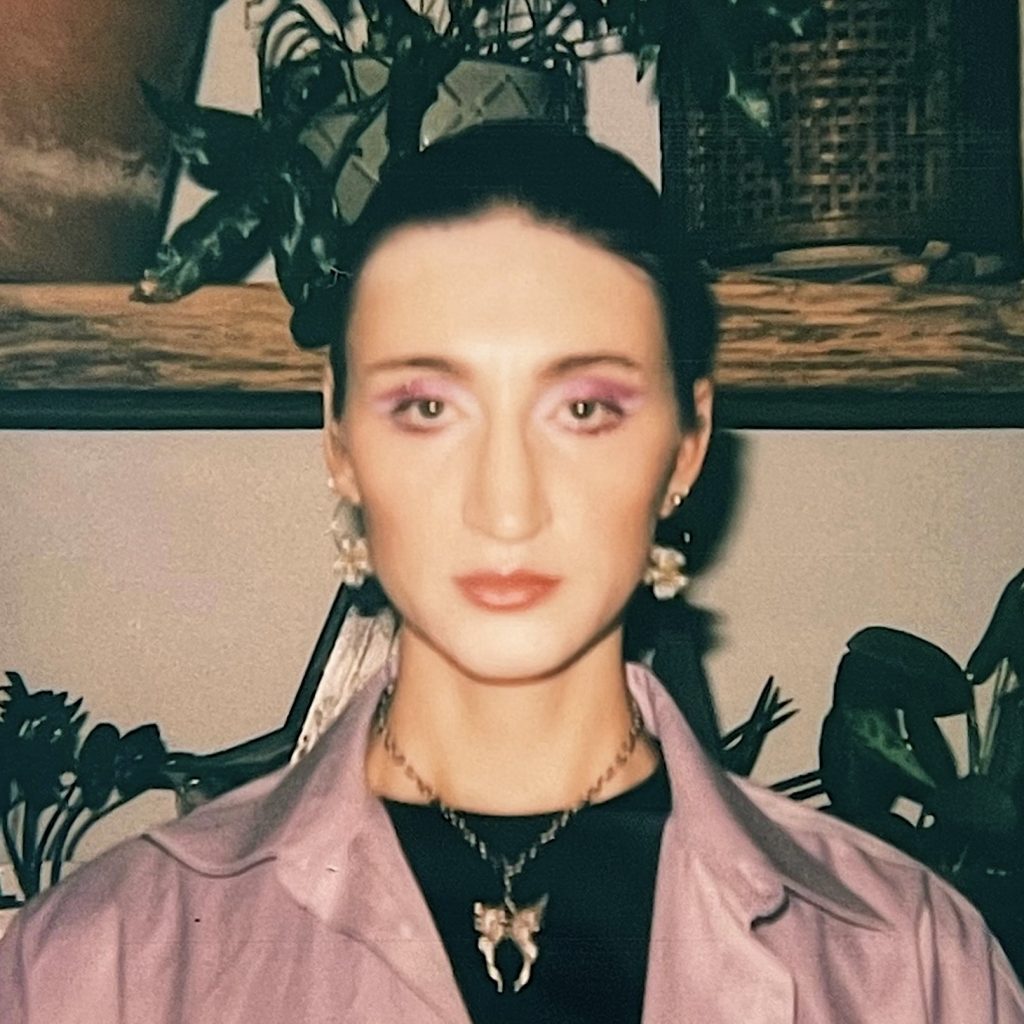
Riley J. Yaxley is a transfemme writer based in Chicago, living on unceded land of the Kickapoo, Peoria, Potawatomi, Miami, and Očhéthi Šakówiŋ peoples. They write across genres, merging arts writing, memoir, autofiction, and poetry as entry points to explore ideas about trans identity, desire, culture, morality, and the complexity of human emotions. Riley is interested in interrogating the often taboo aspects of our lives, drawing connections between culture and the mundanity of our daily lives—as well as interrogating systems of social, cultural, and economic power within the arts world. Their work has appeared in Sixty Inches from Center, Chicago Gallery News, ADF Web Magazine, the School of the Art Institute of Chicago’s emerge: journal of arts administration & policy, and elsewhere. They hold a BA and MA from DePaul University.
